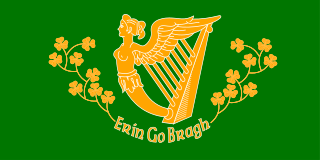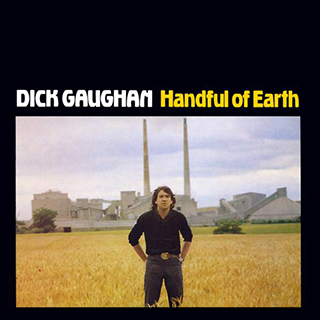
Parallel Lines is the third studio album by American rock band Blondie, released on September 23, 1978, by Chrysalis Records to international commercial success. The album reached No. 1 on the UK Albums Chart in February 1979 and proved to be the band's commercial breakthrough in the United States, where it reached No. 6 on the Billboard 200 in April 1979. In Billboard magazine, Parallel Lines was listed at No. 9 in its top pop albums year-end chart of 1979. The album spawned several successful singles, notably the international hit "Heart of Glass".
Planxty were an Irish folk music band formed in January 1972, consisting initially of Christy Moore, Andy Irvine, Dónal Lunny, and Liam O'Flynn. They transformed and popularized Irish folk music, touring and recording to great acclaim.

Erin go Bragh, sometimes Erin go Braugh, is the anglicisation of an Irish language phrase, Éirinn go Brách, and is used to express allegiance to Ireland. It is most often translated as "Ireland Forever."
Rude Awakening may refer to:
The Boys of the Lough is a Scottish-Irish Celtic music band active since the 1970s.

Richard Peter Gaughan is a Scottish musician, singer and songwriter, particularly of folk and social protest songs. He is regarded as one of Scotland's leading singer-songwriters.

Andrew Kennedy Irvine is an Irish folk musician, singer-songwriter, and a founding member of Sweeney's Men, Planxty, Patrick Street, Mozaik, LAPD and Usher's Island. He also featured in duos, with Dónal Lunny, Paul Brady, Mick Hanly, Dick Gaughan, Rens van der Zalm, and Luke Plumb. Irvine plays the mandolin, mandola, bouzouki, harmonica, and hurdy-gurdy.

The Internationale is a 1990 album by Billy Bragg. Originally released on Bragg's short-lived record label, Utility Records, it is a deliberately political album, consisting mainly of cover versions and rewrites of left-wing protest songs. Although Bragg is known for his association with left-wing causes, this release is unusual; most of Bragg's recordings balance overtly political songs with social observation and love songs.

Paul Joseph Brady is an Irish singer-songwriter and musician from Strabane, Northern Ireland. His work straddles folk and pop. He was interested in a wide variety of music from an early age.
Sweeney's Men was an Irish traditional band. They emerged from the mid-1960s Irish roots revival, along with groups such as The Dubliners and the Clancy Brothers. The founding line-up in May 1966 was Johnny Moynihan, Andy Irvine and "Galway Joe" Dolan.
Ecstasy most often refers to:
Willie O Winsbury is Child Ballad 100. The song, of which there are many variants, is a traditional Scottish ballad that dates from at least 1775, and is known under several other names, including "Johnnie Barbour" and "Lord Thomas of Winesberry".
"Blackleg Miner" is a 19th-century English folk song, originally from Northumberland. Its Roud number is 3193. The song is one of the most controversial English folk songs owing to its depiction of violence against strikebreakers.
"Both sides the Tweed" is a song about the Treaty of Union between Scotland and England. Dick Gaughan made minor changes to the words and added his own tune. The song was written in 1979 and first appeared on Gaughan's 1981 album Handful of Earth. Though Gaughan's recording was embraced by music critics at the time, the song achieved wide popularity only later when it was recorded by the Scottish group Capercaillie on their album Sidewaulk.

Whelan's is a pub and music venue in Dublin, Ireland.

The "Creggan White Hare" is an Irish folk song written by James Molloy. It was first recorded by Paddy Tunney in 1944.

Rude Awakening is Andy Irvine's second solo album, recorded in December 1990 and January 1991 at Westland and Ringsend Studios, Dublin and Frank MacNamara's Park Studio, County Meath, and released in 1991 on Green Linnet Records.

Parallel Lines is a one-off album by Dick Gaughan and Andy Irvine, recorded in August 1981 at Günter Pauler's Tonstudio in St Blasien/Herrenhaus, Northeim, Germany, and released in 1982 on the German FolkFreak-Platten label.

Handful of Earth is the fifth solo studio album by Scottish folk musician and singer Dick Gaughan, released in 1981 by Topic Records. The album was Gaughan's first after spending several years largely avoiding playing music while regaining his health following a mental breakdown in 1979. Containing an array of traditional and contemporary folk songs performed on guitar with open tunings, Handful of Earth was by far Gaughan's most political album to that point, and was inspired by the political turmoil in Scotland following the Conservative Party victory at the 1979 general election.










